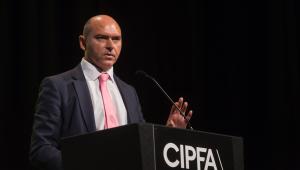The author and self-confessed “tech sceptic” said in the short term, firms like Apple, Microsoft, Google, Facebook and Uber could act as “saviours” for sectors such health, transport, education, energy and welfare by allowing them “to do more with less”.
But he warned that any ‘free’ benefits currently offered by mass data could soon be monopolised and controlled by these corporation, forcing public services to pay for access.
The benefits offered by tech giants could make service delivery a lot cheaper, Morozov acknowledged.
“Companies like Uber and Lift, at least in the United States, but increasingly so in Europe, also present themselves as strategic partners to many public authorities in that they claim that they can take over some of the public infrastructure and transport infrastructure that is underfunded or does not exist at all,” he told delegates.
However Morozov warned that although local authorities and governments may see this as a “reasonable way to reconcile their needs with their resources”, the long-term consequences would be less advantageous to the public sector.
It was “naïve”, he argued, to view data as a resource that has no monetary value attached to it.
“It assumes that we have managed to invent a new form of economics where things can be had for free, without anyone paying for them, so that companies can be considered new providers of some kind of new welfare state.”
Morozov suggested that the current benefits, such as free data-sharing governments and corporations, would not remain free for very long.
He described the mass data-gathering exercise by these companies through the use of their cheap services, products and online advertising as “a privatised Manhattan project” – the 1940s project to develop the nuclear bomb.
Rather than building a bomb, this project has sought to extract data from us by providing as many cheap products and services as possible to develop extremely advanced AI.
Morozov said once these firms have the advanced forms of AI they will use them to create products and offer services which are far superior to any competition at which point the will monopolise the market.
He warned: “They will shift to very different kinds of services, which no longer require advertising and actually have a rent-like model – they can charge us whatever they want for the monthly, weekly or yearly use of those services because they are the only ones who are capable of offering them.”
Morozov said in terms of future health care, which is underwritten by this AI, “it is clear they won’t be offering this for free for forever”.
According to Morozov it is likely the user, or more likely still the taxpayer, will pay for these services.



















